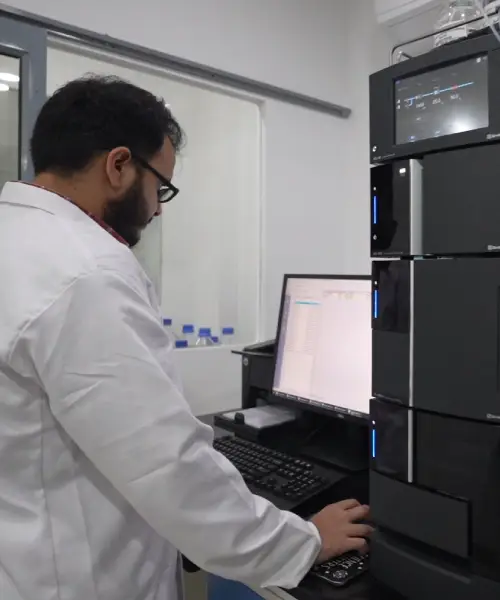
Green Chemistry
The pharmaceutical industry is undergoing a significant transformation, driven by the urgent need to reduce environmental impact while maintaining innovation and cost-efficiency. Green chemistry sustainable synthesis is at the heart of this evolution, offering a powerful solution to design cleaner, safer, and more efficient manufacturing processes.
As environmental regulations tighten and customers become more conscious, pharma companies are embracing sustainability not only as a responsibility but also as a strategic advantage.
What is Green Chemistry?
Green chemistry is the discipline of designing chemical products and processes that reduce or eliminate the use and generation of hazardous substances. This approach applies to every stage of a product’s life cycle-from raw material sourcing and chemical design to manufacturing and disposal.
Unlike traditional chemistry, which often focuses on yield at any cost, green chemistry balances productivity with sustainability and safety. Companies like SCL Lifesciences have integrated green chemistry principles into their core operations, improving not just environmental outcomes but also process economics and compliance.
12 Principles of Green Chemistry
Formulated by Paul Anastas and John Warner, these twelve principles provide a roadmap for sustainable chemical innovation:
- Prevention of waste rather than treating it after formation
- Maximizing atom economy to ensure minimal waste
- Using less hazardous synthesis routes
- Designing safer chemicals that perform well with minimal toxicity
- Use of safer solvents and auxiliaries
- Energy efficiency through low-temperature and ambient pressure reactions
- Use of renewable feedstocks
- Avoiding unnecessary derivatization
- Use of catalytic rather than stoichiometric reagents
- Designing chemicals for degradation to avoid persistence in the environment
- Real-time monitoring to prevent pollution
- Inherently safer chemistry to minimize accidents
These principles are deeply integrated into SCL Lifesciences’ Specialty Chemical Manufacturing approach, enabling them to offer environmentally sound solutions at scale.
Flow Chemistry & Continuous Processing
One of the most effective ways to achieve green chemistry sustainable synthesis is through flow chemistry, also known as continuous processing. Unlike batch processing, flow chemistry allows for real-time control of reaction parameters, which leads to:
- Reduced solvent use
- Higher selectivity and yield
- Greater safety for exothermic and hazardous reactions
- Scalability with minimal environmental footprint
At SCL Lifesciences, flow chemistry is used in the synthesis of APIs and intermediates, contributing to shorter development timelines and lower environmental impact.
Biocatalysis in Pharma
Biocatalysis leverages enzymes to catalyze chemical reactions. In pharmaceutical synthesis, enzymes offer unmatched specificity and operate under mild conditions, reducing the need for harmful solvents and extreme temperatures.
Applications of biocatalysis in green pharma include:
- Asymmetric synthesis of chiral drugs
- Production of active pharmaceutical ingredients (APIs) with minimal by-products
- Enzyme-catalyzed transformations in late-stage functionalization
SCL Lifesciences is actively implementing biocatalysis in the development of cardiovascular and anti-diabetic therapies, reducing both ecological and operational burdens.
Sustainability Metrics
To measure the impact of green initiatives, the industry uses several key sustainability metrics:
- E-Factor (Environmental Factor): Measures the mass of waste per mass of product. Lower E-factors signify cleaner processes.
- PMI (Process Mass Intensity): Calculates total material usage.
- Atom Economy: Evaluates how efficiently reactants are converted into desired products.
- LCA (Life Cycle Assessment): Offers a holistic view of the environmental impact from raw material sourcing to disposal.
By embedding these metrics into development and production, companies like SCL Lifesciences ensure their processes are quantifiably greener.
Examples & Applications
Global pharma leaders are already showcasing the real-world benefits of green chemistry:
- Pfizer improved atom economy in the synthesis of sertraline, eliminating hazardous reagents and solvents.
- Merck & Codexis revolutionized sitagliptin synthesis by replacing metal catalysts with enzymes, reducing waste by 19% and improving overall yield.
- GSK incorporated green chemistry metrics into early R&D, influencing compound selection based on sustainability profiles.
At SCL Lifesciences, green methods are being applied across a range of therapeutic segments ,including CNS, cardiovascular, and anti-diabetic products, enabling safer, more efficient commercial APIs and intermediates.
Syrris & Green Innovation
Flow chemistry pioneers like Syrris offer automated lab-scale systems that are instrumental in implementing green chemistry principles. Their systems enable:
- Continuous synthesis with consistent quality
- Integration of in-line analytics for real-time optimization
- Simplified scale-up from lab to production
SCL Lifesciences collaborates with technology providers and internal R&D experts to adopt such tools and enhance green development pipelines.
Future of Green Chemistry
The future of green chemistry sustainable synthesis is shaped by emerging technologies and stronger regulatory incentives:
- AI and machine learning for predictive synthesis and waste reduction
- Digital twins to simulate and optimize chemical processes
- Bio-based feedstocks replacing petroleum-based inputs
- Increased collaboration between academia, industry, and regulators
SCL Lifesciences is investing in its Knowledge Center in Genome Valley, Hyderabad, to lead innovations in eco-conscious drug development and next-generation chemical processes.
Conclusion
Green chemistry is no longer an option-it’s the blueprint for the future of pharmaceutical manufacturing. By integrating green chemistry sustainable synthesis into process design, pharma companies can reduce environmental impact, cut costs, and improve safety and compliance.
SCL Lifesciences is proud to lead this transformation by offering innovative solutions in Specialty Chemical Manufacturing, advanced intermediates, and API development, all driven by a sustainability-first mindset.





